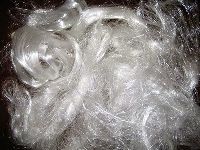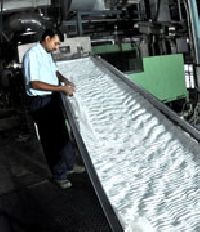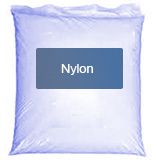
Para Aramid Pulp
Get Price Quote

virgin polyester staple fiber
1 - 1 Per Kilogram
25000 Kilogram (MOQ)
Best Deals from Synthetic Fibers

Polyfill Fiber
Get Price Quote

Nylon Fiber
Get Price Quote
Nylon Fibers: These are long and soft filaments which are produced by high speed melt-spinning and mostly belong to Nylon6 or Nylon-66 types. Various forms of nylon filaments may be produced depending on application – single filament or multi-filament. A unique feature of these fibers is their elasticity and varying degrees of lustre, which is used in making garments.

Polyester Staple Fiber
Get Price Quote
Polyester Staple Fibre (PSF) has emerged as the fastest-growing fibre amongst all types of manufactured fibres. Polyesters are made by polymerisation of Purified Terephthalic Acid (PTA) and Mono Ethylene Glycol (MEG). The polymer thus obtained is melt spun and the bundle of continuous filaments obtained by melt spinning is called tow. The tow is subjected to further processes like drawing, crimping, spin finish application and then cut into fixed lengths to get cut fibres almost equal in length to cotton fibres. These cut fibres are known as PSF. Technology Constant on-line checks maintain consistent quality. Superior spin-finish application ensures smoother working of fibre during spinning. Merge number remains consistent over longer periods. Standard bale weight is maintained. Quality that conforms to international benchmarks Quality is way of life at Indo Rama. It is our constant endeavor to ensure that our products meet the most stringent international quality standards. We are confident that the yarns produced from our fibre can be benchmarked against the best in the world.

nylon fibers
Get Price Quote
Nylon is a common term used for a family of synthetic fibers. Chemically, these are polymers from the semi-aromatic polyamides category. As one of the most versatile polymers with extensive industrial and home applications, Nylon has created a revolution in terms of usage. In fact, it was the first textile fiber made from organic materials. Typically, Nylon is produced through the reaction of adipic acid with hexamythelene diamine which forms a large molecule via fusion. This process is called condensation polymerisation. A common fiber form of nylon i.e. nylon 6, is prepared in this manner. Nylon occurs in a variety of forms: Nylon Fibers: These are long and soft filaments which are produced by high speed melt-spinning and mostly belong to Nylon6 or Nylon-66 types. Various forms of nylon filaments may be produced depending on application – single filament or multi-filament. A unique feature of these fibers is their elasticity and varying degrees of lustre, which is used in making garments. Extruded Nylon Shapes: Nylon 6 is commonly used as moulded nylon for various industrial and commercial applications. Nylon is used as a reinforcing additive for imparting tenacity and heat resistance to devices such as printers and car components. Nylon Filaments: These slightly differ from nylon fibers on account of added tensile strength. Nylon filaments are used in brushes, parachutes, fishing lines, etc. Nylon Powder: Nylon can also be reduced to a powder form which is used as powder coating for metal fittings, such as pipes.

Polyester Staple Fiber
Get Price Quote
Polyester Staple Fiber

synthetic fibres
Get Price Quote
synthetic fibres, PVC Artificial Leather Saddlery

Polyester Fiber
Get Price Quote
Polyester Fiber

Polyester Staple Fibers
Get Price Quote
Polyester Staple Fibers, Virgin, recycled

Para Aramid Staple Fiber 38 mm , 51 mm and 64 mm
Get Price Quote
Para Aramid Staple Fiber 38 mm, 51 mm and 64 mm

fibres
Get Price Quote
fibres, Yarns, Fabrics, T-Shirts, Sweaters

poly fibre
Get Price Quote
poly fibre, polyestar wadding, computerised quilting, Cushions, Chair Pads